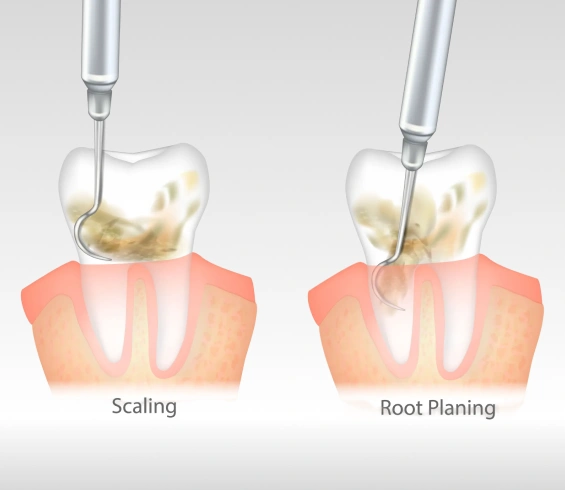
Deep Cleaning Treatment for Healthy Gums
Scaling and root planing is a specialized, non-surgical deep cleaning procedure designed to treat gum disease by removing plaque, tartar, and bacteria from beneath the gum line. This treatment helps stop the progression of gum disease, restore gum health, and protect the tissues and bone supporting your teeth. It is often considered the “gold standard” for managing mild to moderate periodontal disease and preventing more serious complications, including tooth loss.
What is Scaling & Root Planing?
Scaling and root planing focuses on two key steps:
- Scaling: Plaque and tartar are carefully removed from the tooth surfaces and below the gum line using specialized dental instruments, eliminating harmful bacteria and buildup.
- Root Planing: The tooth roots are smoothed to prevent bacteria from easily reattaching, promoting healing and allowing the gums to securely reattach to the teeth.
This procedure is recommended when gum disease has caused pockets to form between the teeth and gums. These pockets trap bacteria and plaque, leading to inflammation, infection, and potential damage to the bone supporting the teeth. Early intervention can prevent serious complications and may even reverse some gum damage.
Signs You May Need Scaling & Root Planing
- Bleeding Gums: Gums that bleed during brushing, flossing, or eating may indicate gum disease.
- Swollen or Tender Gums: Red, inflamed, or painful gums are a common sign of periodontal issues.
- Persistent Bad Breath: Chronic bad breath can result from bacteria and plaque buildup beneath the gum line.
- Receding Gums: Gums that pull away from teeth, exposing more of the tooth surface, signal advanced gum disease.
- Loose Teeth: Bone loss from gum disease may cause teeth to feel loose or shift position.
If you experience any of these symptoms, a professional consultation is important to determine whether scaling and root planing is the right treatment for you.
The Scaling & Root Planing Procedure
The process typically includes three stages:
1. Evaluation and Diagnosis
- A thorough evaluation of gums and teeth, including measurement of gum pocket depths and possible X-rays to assess bone health.
- A customized treatment plan is developed, explaining the procedure and answering any questions.
2. Deep Cleaning Procedure
- Local anesthesia may be applied to ensure comfort during the procedure.
- Plaque, tartar, and bacteria are meticulously removed from below the gum line and around the tooth roots.
- Roots are smoothed to reduce pocket depth, prevent bacteria from reattaching, and allow gums to heal properly.
3. Aftercare and Recovery
- Detailed aftercare instructions are provided, including brushing, flossing, and rinsing techniques to promote healing.
- Follow-up visits monitor progress and, if necessary, additional cleanings may be scheduled.
- Periodic periodontal maintenance is often recommended to prevent gum disease recurrence.
Advantages of Deep Gum Cleaning
- Prevents Tooth Loss: Treating gum disease early protects the supporting bone and tissue, reducing the risk of losing teeth.
- Reduces Inflammation and Infection: Removing bacteria and plaque helps lower gum inflammation and infection.
- Improves Gum Health: Smoothing the tooth roots encourages healing and reattachment of the gums, reducing pocket depth.
- Fresher Breath: Eliminating the bacteria and plaque that cause bad breath leads to a cleaner, healthier mouth.
Why Choose Professional Care for Scaling & Root Planing?
- Expert Periodontal Care: Treatments are performed by experienced dental professionals, ensuring precision and safety.
- Patient Comfort: Local anesthesia and gentle techniques make the procedure as comfortable as possible.
- Comprehensive Oral Health: Deep cleaning is part of a holistic approach, including preventive, cosmetic, and restorative dental care.
- Advanced Technology: Modern tools and methods enhance the effectiveness and efficiency of treatment, leading to long-lasting results.
Choosing professional care for scaling and root planing ensures that your gums are treated effectively, helping to prevent future complications and maintain long-term oral health and a confident smile.
